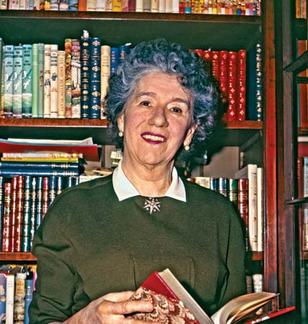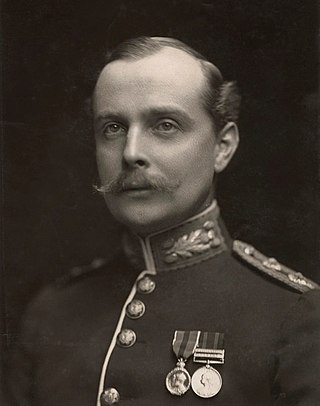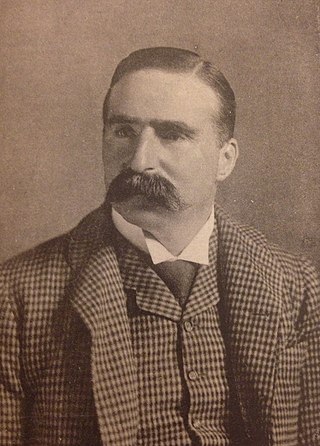
Enid Mary Blyton was an English children's writer, whose books have been worldwide bestsellers since the 1930s, selling more than 600 million copies. Her books are still enormously popular and have been translated into ninety languages. As of June 2019, Blyton held 4th place for the most translated author. She wrote on a wide range of topics, including education, natural history, fantasy, mystery, and biblical narratives. She is best remembered for her Noddy, Famous Five, Secret Seven, the Five Find-Outers, and Malory Towers books, although she also wrote many others, including; St. Clare's, The Naughtiest Girl, and The Faraway Tree series.

Major George Frederick Myddleton Cornwallis-West was a British officer of the Scots Guards. George Cornwallis-West was noted primarily for his marriages, the first to Lady Randolph Churchill, mother of Winston Churchill, and the second to the renowned actress Stella Campbell, who was also known on the stage as Mrs Patrick Campbell. George Bernard Shaw wrote the part of Eliza Doolittle in his play Pygmalion for her.

Brigadier Charles Calveley Foss, was an English recipient of the Victoria Cross (VC), the highest and most prestigious award for gallantry in the face of the enemy that can be awarded to British and Commonwealth forces. A professional soldier in the British Army, he was awarded the VC in 1915 for his actions during the Battle of Neuve Chapelle.

Sir William James Montgomery-Cuninghame, 9th Baronet was a British Army officer from Scotland, Conservative politician and Victoria Cross recipient.

The Royal Scots Fusiliers was a line infantry regiment of the British Army that existed from 1678 until 1959 when it was amalgamated with the Highland Light Infantry to form the Royal Highland Fusiliers which was later itself merged with the Royal Scots, King's Own Scottish Borderers, the Black Watch, the Argyll and Sutherland Highlanders and the Highlanders to form a new large regiment, the Royal Regiment of Scotland.
Fabian Strachan Woodley, MC was a British newspaperman, a soldier in the Great War, a schoolmaster, and a poet.
Gillian Mary Baverstock was a British author, non-fiction writer and memoirist. She was the elder daughter of English novelist Enid Blyton and her first husband, Hugh Pollock. She wrote and spoke to audiences and the media extensively about her mother as well as her own childhood and life.
Brigadier-General Francis Charles Bridgeman JP, styled The Honourable from 1865, was a British Army officer and Conservative politician who sat in the House of Commons from 1885 to 1895.
Geoffrey Cecil Twisleton-Wykeham-Fiennes, 18th Baron Saye and Sele was an English soldier and Liberal politician from the Twisleton-Wykeham-Fiennes family. He served as Comptroller of the Household between 1912 and 1915.
Lieutenant-General Sir Sydney Turing Barlow Lawford, KCB, was a decorated British general, later to become the father of Hollywood actor Peter Lawford.
Ida Julia Pollock was a British writer of several short-stories and over 125 romance novels that were published under her married name, Ida Pollock, and under a number of different pseudonyms: Joan M. Allen; Susan Barrie, Pamela Kent, Averil Ives, Anita Charles, Barbara Rowan, Jane Beaufort, Rose Burghley, Mary Whistler and Marguerite Bell. She sold millions of copies over her 90-year career. She has been referred to as the "world's oldest novelist" who was still active at 105 and continued writing until her death. On the occasion of her 105th birthday, Pollock was appointed honorary vice-president of the Romantic Novelists' Association, having been one of its founding members.

Colonel Richard Davies Garnons Williams was a British Army officer and Welsh rugby union player who represented Wales, Brecon and Newport. He played in the first Wales international rugby union match in 1881.
Major General Sir Edmund Hakewill-Smith, was a senior British Army officer who served in both the First and Second World Wars.
Rosemary Pollock was a British writer of a dozen romance novels from 1968 to 1981. She was the daughter of the centenarian romance writer and painter Ida Pollock (1908–2013) and Lieut Colonel Hugh Alexander Pollock D.S.O. Royal Scots Fusilers (1888–1971).

Lieutenant-Colonel Anthony Mildmay Julian Fane, 13th Earl of Westmorland, CBE, JP, styled Lord Burghersh between October 1859 and 1891, was a British peer.
The 155th Brigade was an infantry brigade of the British Army that saw active service in both the First and the Second World Wars. Assigned to the 52nd (Lowland) Division, the brigade saw active service in the Middle East and on the Western Front during the First World War. During the Second World War, now the 155th Infantry Brigade, it continued to serve with the 52nd Division in Operation Dynamo, and later in North-western Europe from late 1944 until May 1945.
Brigadier Henry Coventry Maitland-Makgill-Crichton, was a Scottish senior officer in the British Army. A graduate of the Royal Military College, Sandhurst, Maitland served as an officer in the Royal Scots Fusiliers during the Second Boer War and the First World War. He was severely wounded in both conflicts and received multiple mentions in despatches.

George Newnes Ltd is a British publisher. The company was founded in 1891 by George Newnes (1851–1910), considered a founding father of popular journalism. Newnes published such magazines and periodicals as Tit-Bits, The Wide World Magazine, The Captain, The Strand Magazine, The Grand Magazine, John O'London's Weekly, Sunny Stories for Little Folk, Woman's Own, and the "Practical" line of magazines overseen by editor Frederick J. Camm. Long after the founder's death, Newnes was known for publishing ground-breaking consumer magazines such as Nova.

The Imtarfa Military Cemetery is a cemetery in Mtarfa on Triq Buqana in the Northern Region of Malta. The cemetery contains over 1,400 interments and commemorations including 254 graves of military personnel killed in the country in World War I and World War II. Many graves are marked by Commonwealth War Graves Commission (CWGC) gravestones. Some of the CWGC graves are damaged due to bombing of a nearby airfield in the Second World War.
August Julius Clemens Herbert Reuter, 2nd Baron de Reuter was a British businessman in London who spent most of his adult life working for his father's news agency, Reuters, of which he was general manager for 37 years, from 1878 until his death.








